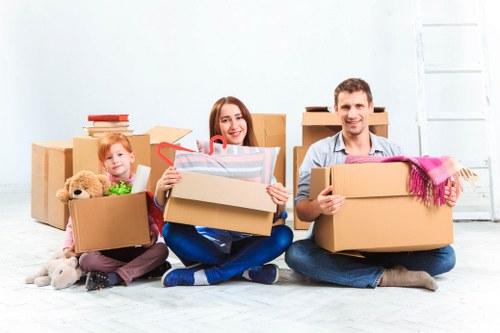Council Waste Collection Slough: Everything You Need to Know

Managing household waste is an essential service provided by the Council Waste Collection in Slough. Efficient waste collection not only keeps the town clean but also plays a critical role in environmental conservation. Understanding how the system works, what can be collected, and how to participate effectively ensures that residents contribute positively to their community.
The Slough Borough Council offers various waste collection services tailored to meet the needs of its diverse population. From regular household waste to recycling and hazardous waste, the council provides comprehensive solutions to handle different types of waste responsibly.
Residents can schedule waste collections, learn about recycling guidelines, and find information on special waste collection events through the council’s official website or local offices. Staying informed about these services helps maintain the town’s cleanliness and supports sustainable practices.

Types of Waste Collection Services
Slough offers a range of waste collection services to cater to various needs. These services include:
- General Waste Collection: Regular collection of household non-recyclable waste.
- Recycling Services: Collection of paper, plastic, glass, and metal items for recycling.
- Garden Waste Collection: Specialized services for disposing of garden clippings and green waste.
- Bulky Waste Collection: Scheduled pickups for large items that do not fit into regular bins.
- Hazardous Waste Collection: Safe disposal of hazardous materials like chemicals and electronics.
Each type of waste has specific guidelines to ensure proper handling and disposal, contributing to environmental sustainability.
Understanding the different waste categories helps residents separate their waste effectively, making the collection process more efficient and eco-friendly.

General Waste Collection
General waste collection in Slough involves the pickup of non-recyclable household waste. Residents are provided with designated bins that need to be placed at the curb on scheduled collection days.
It is important to follow the council’s guidelines on what constitutes general waste to ensure that recyclable and hazardous materials are handled appropriately. Items such as food waste, diapers, and broken household items typically fall under general waste.
The council may offer different bin sizes depending on the household size and the amount of waste generated. Proper usage of these bins helps streamline the collection process and reduces unnecessary pickups.

Recycling Services
Recycling is a crucial part of the Council Waste Collection services in Slough. The council encourages residents to sort their waste into recyclable and non-recyclable categories to minimize landfill usage and conserve resources.
Common recyclable items include:
- Paper and cardboard
- Plastics marked with recycling symbols
- Glass bottles and jars
- Metal cans and tins
- Electronics for e-waste recycling
The council provides separate recycling bins and clear guidelines on how to prepare items for recycling, such as rinsing containers and removing non-recyclable parts. Participating in recycling programs helps reduce environmental impact and supports a sustainable future for Slough.
Recycling not only benefits the environment but also promotes a sense of community responsibility among residents.

Bulky Waste Collection
Bulky waste refers to large items that cannot be disposed of through regular waste collection. Slough’s Council Waste Collection provides scheduled pickups for items like furniture, appliances, and large electronics.
Residents need to book a bulky waste collection slot through the council’s website or by contacting local offices. It is advisable to arrange these pickups during low collection periods to ensure timely service.
Proper disposal of bulky waste prevents cluttering of public spaces and ensures that large items are managed in an environmentally responsible manner. Some bulky waste items may be eligible for recycling or donation, further promoting sustainability.
By utilizing bulky waste collection services, residents contribute to maintaining a clean and organized community environment.
Special Waste Collection
Special waste collection handles items that require careful disposal due to their hazardous nature. This includes chemicals, batteries, paints, and electronic waste.
The Council Waste Collection in Slough organizes special collection events periodically, providing residents with opportunities to dispose of these items safely. Alternatively, designated drop-off points are available for household hazardous waste.
Proper disposal of special waste prevents environmental contamination and health hazards. The council provides detailed instructions on handling and preparing these items for collection, ensuring that they are managed in accordance with safety regulations.
Residents are encouraged to take advantage of special waste collection services to maintain a safe and healthy community.
Garden Waste Collection
Garden waste, including grass clippings, leaves, and branches, is collected separately to promote green waste recycling. Slough’s Council Waste Collection offers dedicated pickups for garden waste, helping to keep public and private spaces free of debris.
Residents can use specific bins or bags provided by the council to store their garden waste. It is important to ensure that garden waste is free from contaminants before collection to facilitate effective recycling processes.
Recycling garden waste supports the production of compost and other environmentally beneficial products, contributing to a greener Slough.
Engaging in garden waste collection helps maintain the town’s aesthetic appeal and supports sustainable waste management practices.
Scheduling and Booking Collections
Scheduling waste collections in Slough is a straightforward process. Residents can view collection schedules, book special pickups, and manage their waste services through the council’s online portal or by contacting customer service.
It is important to adhere to the scheduled collection days to ensure timely waste management. Missing a collection can lead to delays and potential overflow of waste containers.
The council may offer flexible scheduling options for households with specific needs, ensuring that all residents have access to the services they require.
Timely scheduling and adherence to collection guidelines enhance the efficiency of waste management services and promote community cleanliness.
Recycling Guidelines
Recycling effectively requires following specific guidelines set by the Slough Borough Council. These guidelines ensure that recyclable materials are processed correctly and efficiently.
Key recycling practices include:
- Separation: Sort waste into designated categories such as paper, plastics, glass, and metals.
- Cleaning: Rinse containers to remove food residues and prevent contamination.
- Preparation: Flatten cardboard boxes and remove non-recyclable parts from items.
- Sorting: Place recyclables in the correct bins provided by the council.
Adhering to these guidelines not only facilitates efficient recycling but also minimizes waste processing costs.
Educating oneself about recycling practices ensures that each household contributes effectively to the town’s recycling efforts.
Environmental Impact
Effective waste collection and recycling services have a significant positive impact on the environment. By reducing the amount of waste sent to landfills, Slough minimizes its ecological footprint and conserves natural resources.
Recycling materials like paper, glass, and metals reduces the need for raw material extraction, lowering energy consumption and greenhouse gas emissions. Proper waste management also helps prevent pollution of air, water, and soil.
Engaging in responsible waste disposal practices supports biodiversity and promotes a healthier ecosystem. It also aligns with national and global environmental goals, contributing to a sustainable future.
Residents’ participation in council waste collection services is crucial for achieving these environmental benefits.
Community Engagement
Community engagement is vital for the success of waste collection programs. Slough Borough Council encourages residents to participate actively in waste management initiatives through awareness campaigns and educational programs.
Workshops and informational sessions teach residents about recycling, waste reduction, and proper disposal techniques. These programs aim to foster a culture of sustainability and environmental responsibility.
Volunteer opportunities and community clean-up events provide hands-on experiences, strengthening community bonds and enhancing the town’s cleanliness.
Active community involvement ensures that waste management strategies are effectively implemented and maintained.
Challenges and Solutions
Waste collection services face several challenges, including increasing waste volumes, contamination of recyclables, and logistical constraints. Slough Borough Council addresses these challenges through various strategies:
- Public Education: Raising awareness about waste reduction and proper recycling practices to minimize contamination.
- Infrastructure Investments: Upgrading waste collection vehicles and facilities to handle larger volumes efficiently.
- Policy Implementation: Enforcing regulations on waste disposal and promoting sustainable practices among residents.
- Innovative Technologies: Incorporating smart waste management systems to optimize collection routes and schedules.
By tackling these challenges proactively, the council ensures the continued effectiveness and sustainability of waste collection services.
Collaborative efforts between the council and the community are essential for overcoming obstacles and enhancing waste management systems.
Future Initiatives
Looking ahead, Slough Borough Council plans to introduce several initiatives to improve waste collection services. These include expanding recycling programs, increasing the frequency of collections, and integrating advanced technologies.
Upcoming projects aim to reduce waste generation through public awareness and incentivizing sustainable practices. By promoting recycling and composting, the council seeks to further decrease landfill dependency.
Investment in research and development will explore new methods for waste processing and resource recovery, fostering innovation in waste management.
These future initiatives demonstrate the council’s commitment to creating a cleaner, greener Slough for generations to come.
Nearby Areas to Slough
Slough is surrounded by several nearby areas that also benefit from the council’s waste collection services. These areas include:
- Langley: Located just east of Slough, Langley is known for its residential neighborhoods and local parks, relying on Slough’s efficient waste management.
- Wexham Lea: Situated to the northwest, Wexham Lea features a mix of housing and small businesses, utilizing the council’s recycling programs.
- Beaurepaire: To the north, Beaurepaire is a predominantly residential area that benefits from regular waste and recycling collections.
- West Slough: As a key area within Slough, West Slough has well-established waste collection services supporting its diverse community.
- Haymill: Located southwest, Haymill is known for its green spaces and relies on garden waste collection services.
- Oakridge: A suburban area to the southeast, Oakridge utilizes the council’s bulky waste and general waste collection services.
- Marlow: Positioned to the west, Marlow benefits from special waste collection events and hazardous waste disposal services.
- Burnham: South of Slough, Burnham is a growing community that uses the council’s comprehensive waste management solutions.
- Poyle: Close to the River Thames, Poyle handles its waste through nearby Slough’s efficient collection systems.
- Kennet: Located nearby, Kennet offers residential and commercial areas that participate in Slough’s recycling initiatives.
- Windsor: Adjacent to Slough, Windsor takes advantage of the council’s extensive waste collection and recycling programs.
- Feltham: East of Slough, Feltham uses the same waste management services, ensuring consistency across regions.
- Langley Green: This area benefits from regular general and recycling collections managed by the council.
- Maidenhead: A bit further west, Maidenhead coordinates with Slough for specialized waste collection needs.
Each of these areas contributes to and benefits from Slough’s robust waste collection infrastructure, promoting a clean and sustainable environment across the region.
Participation and Responsibility
Residents of Slough and surrounding areas play a crucial role in the effectiveness of waste collection services. By following guidelines, separating waste correctly, and participating in recycling programs, individuals can significantly impact the community’s cleanliness and environmental health.
Taking personal responsibility for waste management not only supports council efforts but also fosters a sense of pride and ownership over the local environment.
Encouraging neighbors and local businesses to engage in proper waste disposal practices amplifies these positive effects, leading to a more cohesive and sustainable community.
Collective participation ensures that waste management systems function smoothly and that Slough remains a clean and pleasant place to live.
FAQs
1. How often is general waste collected in Slough?
General waste is typically collected once a week. Residents receive a schedule from the council indicating their specific collection day.
2. What items are accepted in the recycling collection?
Accepted items include paper, cardboard, plastic bottles, glass containers, metal cans, and certain electronics. It is important to follow the council’s recycling guidelines to ensure proper processing.
3. How can I book a bulky waste collection?
You can book a bulky waste collection through the Slough Borough Council’s website or by contacting their customer service directly.
4. Are there any fees for hazardous waste collection?
Hazardous waste collection is generally free during special collection events. However, fees may apply for regular services. It’s best to check with the council for specific details.
5. What should I do with expired household chemicals?
Expired household chemicals should be disposed of through the council’s hazardous waste collection services to ensure safe and environmentally friendly handling.